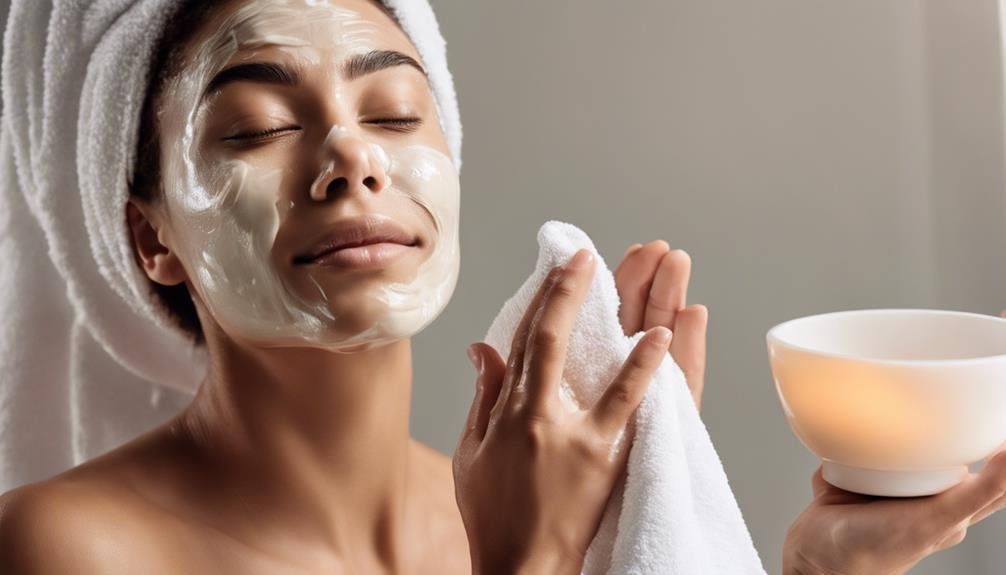If you think achieving glowing, flawless skin requires a complicated and expensive routine, think again. By making a few simple changes to your daily habits, you can transform the health and appearance of your skin. From the basics of hydration and sun protection to the importance of a nourishing diet, enhancing your skin health doesn't have to be overwhelming. Ready to discover the key to radiant skin that reflects your inner vitality?
Hydration
To achieve optimal skin health, maintaining proper hydration is essential. Water intake plays a crucial role in keeping your skin looking healthy and vibrant. Adequate hydration not only benefits your overall health but also has a direct impact on the appearance of your skin. When your body is well-hydrated, your skin is more likely to appear plump, smooth, and radiant.
In addition to drinking enough water throughout the day, incorporating hydrating skincare products into your routine can further enhance the moisture levels in your skin.
Look for products that contain ingredients like:
- hyaluronic acid
- glycerin
- ceramides
These ingredients can help attract and retain moisture in the skin.
Sun Protection
During sun exposure, your skin is vulnerable to damage from harmful UV rays, making sun protection a crucial aspect of maintaining skin health. To shield your skin effectively, always prioritize the importance of SPF. Choose a broad-spectrum sunscreen with SPF 30 or higher to safeguard against both UVA and UVB rays. Remember to reapply every two hours, especially if you're swimming or sweating.
Additionally, donning protective clothing like wide-brimmed hats, sunglasses, and long sleeves can provide an extra layer of defense.
Proper sunscreen application is key to maximizing protection. Apply it generously to all exposed areas of skin, including often overlooked areas like your ears, neck, and the tops of your feet. Be mindful of UV exposure, which isn't limited to sunny days – UV rays can penetrate through clouds, so sun protection should be a daily habit, rain or shine.
Cleansing Routine

Effective cleansing plays a vital role in maintaining healthy skin. It helps remove impurities, excess oil, and dead skin cells, allowing your skin to breathe and function optimally. When it comes to your cleansing routine, incorporating proper techniques and understanding the benefits of exfoliation are essential for achieving a clear and radiant complexion.
Exfoliation Benefits and Proper Technique
| Exfoliation Benefits | Proper Technique |
|---|---|
| Removes dead skin cells, revealing fresh skin underneath | Use a gentle exfoliator 2-3 times a week |
| Unclogs pores, preventing breakouts and blackheads | Apply in circular motions, avoiding harsh scrubbing |
| Improves skin texture and promotes cell turnover | Rinse thoroughly with lukewarm water |
Moisturizing
When moisturizing your skin, it's important to choose a product that suits your skin type and addresses specific concerns. Consistency is key in maintaining healthy skin. Select moisturizers with ingredients like hyaluronic acid for hydration or ceramides for repairing the skin barrier. The best moisturizing products are those that are non-comedogenic and fragrance-free to prevent irritation.
For a pampering treat, consider DIY moisturizing masks using natural ingredients like honey, avocado, or yogurt to nourish and hydrate your skin. Apply these masks weekly for an added boost of moisture.
When applying your moisturizer, remember to cleanse your skin first and gently pat it dry. Take a small amount of product and warm it between your hands before massaging it into your skin using upward motions.
Don't forget to moisturize your neck and décolletage as well.
Healthy Diet

To maintain optimal skin health, incorporating a balanced and nutrient-rich diet is essential. Consuming nutrient-rich foods and balanced meals can significantly impact the health and appearance of your skin. Here are some key dietary tips to support your skin health:
- Hydrate: Drink plenty of water throughout the day to keep your skin hydrated and maintain its elasticity.
- Antioxidant-rich Foods: Include fruits and vegetables like berries, spinach, and kale in your diet to provide your skin with essential antioxidants that combat free radicals.
- Omega-3 Fatty Acids: Incorporate sources of omega-3 fatty acids such as salmon, walnuts, and flaxseeds to help reduce inflammation and keep your skin supple.
- Protein: Ensure you consume an adequate amount of protein from sources like lean meats, eggs, and legumes to support collagen production and repair skin tissues.
Adequate Sleep
Prioritizing adequate sleep is crucial for maintaining optimal skin health. Your sleep schedule plays a significant role in how your skin looks and feels. When you don't get enough sleep, your body produces more cortisol, a stress hormone that can lead to skin issues like acne and inflammation. Managing your stress levels is essential for improving your sleep quality, which in turn benefits your skin.
Consider the table below for tips on how to enhance your sleep schedule and manage stress effectively:
| Tips for Sleep Schedule | Tips for Stress Management | Benefits |
|---|---|---|
| Establish a bedtime routine | Practice deep breathing exercises | Improved skin elasticity |
| Maintain a consistent sleep schedule | Engage in regular physical activity | Reduced inflammation |
| Create a relaxing sleep environment | Try mindfulness meditation | Enhanced skin repair and regeneration |
| Limit caffeine and screen time before bed | Seek social support | Radiant complexion and reduced signs of aging |
Frequently Asked Questions
Can Stress Affect My Skin Health?
Yes, stress can impact your skin health. Effective stress management techniques can help improve skin conditions. Incorporating consistent skin care routines alongside stress management can promote healthier skin. Prioritize self-care practices to benefit both your mental well-being and skin health.
Is It Okay to Wear Makeup Every Day?
You know, wearing makeup daily can clog pores and lead to skin issues. Remember, proper makeup removal and skin hydration are crucial. Give your skin some breathing room by going makeup-free now and then.
How Often Should I Exfoliate My Skin?
You should exfoliate your skin 1-3 times a week to remove dead skin cells and reveal a brighter complexion. Look for gentle exfoliants like AHAs or BHAs. Exfoliation boosts cell turnover, unclogs pores, and enhances product absorption for healthier skin.
Can Smoking Affect My Skin's Appearance?
Yes, smoking can greatly affect your skin's appearance. It accelerates aging, causes wrinkles, dullness, and can lead to skin cancer. Combining smoking with effects of pollution worsens skin damage. Prioritize skincare routines and quit smoking for healthier skin.
Are There Specific Foods That Can Worsen Skin Conditions?
You won't believe how much dairy can impact your skin! High dairy consumption might worsen skin conditions due to hormonal effects. Additionally, excessive sugar intake can lead to inflammation, potentially exacerbating skin issues. Be mindful of your diet!
Conclusion
In conclusion, remember that good skin health is not just about what you put on your skin, but also what you do for your body as a whole. As the saying goes, "You are what you eat." So, nourish your skin from the inside out with a balanced diet, stay hydrated, protect yourself from the sun, maintain a regular skincare routine, and get enough rest. Your skin will thank you for it in the long run.




